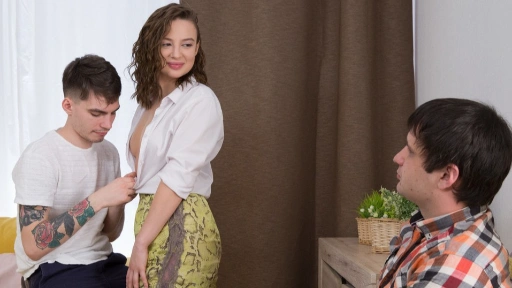Kevin didn’t come to therapy because of a relationship breakdown. He wasn’t struggling with compulsive porn use, nor had he experienced any kind of sexual trauma. On paper, his life looked stable: late-20s, steady job as a graphic designer, an apartment with bookshelves full of Murakami and Bukowski, and a small circle of creative friends. Emotionally reserved, romantically cautious, and sexually conventional. At least, that’s how he would have described himself.
Until Sophie said it.
“You probably want to watch me fuck someone, don’t you?”
It was a joke. She smirked when she said it. They were a few drinks in, leaning against her kitchen counter late one night, debriefing bad Tinder dates and exes who couldn’t hold a conversation. Kevin laughed it off. Changed the subject. But that night, something changed in him. He couldn’t stop replaying it. Not just the words—but the way she looked at him. The boldness. The comfort. The permission.
He was hard the entire night. He didn’t masturbate. He didn’t even fully understand what he was feeling. He just sat with it—turned on, unsettled, and weirdly emotional.
That’s when he found me.
The Erotic Ambiguity of a Safe Female Friend
Kevin and Sophie had never been physical. They were emotionally intimate but strictly platonic—though Kevin admitted he had always found her beautiful in a way that made him feel… quiet. She wasn’t intimidating, but she didn’t make herself small for men either. She was sexually experienced, irreverent, and curious. She often joked about her own body the way men joked about theirs. There was a safety in her. And maybe that’s why, when she made the joke, it felt less like teasing and more like naming something he hadn’t admitted to himself yet.
In our first session, Kevin tried to downplay it.
“I don’t know if this is a real issue,” he said.
“But ever since that night, I’ve been imagining her with someone else, and instead of being jealous, I just… want to be there. Watching. Not involved. Just watching.”
I nodded and said something I’ve said many times before:
“It doesn’t have to be a problem to be worth exploring.”
The Moment Fantasy Becomes Identity
Over the next few sessions, Kevin opened up more. He wasn’t ashamed of Sophie—he was ashamed of what he wanted from her now. He didn’t want to compete with other men for her. He wanted to surrender the competition entirely. He said it like a confession:
“I think I want to be the guy she forgets is in the room. Like, I want her to be with someone else, and I just sit quietly. That turns me on more than actually sleeping with her.”
This is where the clinical work deepens. What Kevin was experiencing was not classic masochism or voyeurism. It was a blend of:
- Erotic passivity: The arousal that comes from witnessing pleasure rather than participating in it.
- Emotional voyeurism: A desire to feel included emotionally in another person’s experience of intimacy, without being physically involved.
- Early-stage cuckold psychology: A unique form of desire rooted in surrender, admiration, and psychological distance—not humiliation or degradation.
He wasn’t looking for pain. He was looking for purpose inside powerlessness. For Kevin, not being chosen wasn’t erotic because he wanted to be ignored. It was erotic because being ignored by someone he cared about felt real. It stripped away the performance of dating, the illusions of mutual seduction. It was intimacy with no illusion.
When She Becomes the Mirror
One of Kevin’s breakthroughs came during a session where we unpacked a dream he’d had:
In the dream, Sophie was in another room with a man. Kevin sat on the couch, alone. She came out midway through, walked over to him, and gently kissed his forehead. Then she turned around and went back to the man. He said he woke up crying—and hard.
It wasn’t about sex. It was about proximity to her pleasure. About being trusted to witness it. About loving her enough to not be the one she chose, and still stay.
And that’s when I told him what I knew he was ready to hear:
“What you’re describing isn’t just a kink. It’s a type of erotic identity. And it’s not wrong.”
Not Every Fantasy Needs to Be Acted On
It’s important to say: Kevin never told Sophie. He didn’t need to. He wasn’t looking to initiate anything or cross a line. What he needed was language for what he was feeling. And once he had that, the shame loosened.
He stopped asking himself if he was broken. He stopped watching hours of humiliation porn that made him feel sick afterward. He even started dating again—with more clarity and honesty than before. He told one woman early on that he had a voyeuristic side and liked power dynamics. She didn’t judge. She asked him questions.
That was a turning point.
By the time we wrapped up our final session, Kevin said something that stuck with me:
“I don’t think I want to watch Sophie anymore. I think I just needed to know it was okay to want that—and not feel crazy for it.”
Key Takeaways for Readers
- Cuckold fantasy doesn’t always start with a romantic partner. Sometimes it’s triggered by emotionally safe friendships that unintentionally invite us to feel our own erotic truth.
- Desire and shame often show up together. Understanding one helps dismantle the other.
- Not every fantasy has to be acted on. Sometimes, simply naming it is enough to take away its sting—and integrate it into your identity in a healthy, grounded way.
- Cuckold psychology isn’t just about sex. It’s about identity, emotional placement, and how we relate to power, intimacy, and self-worth.
- Therapy can help unravel erotic confusion. Especially when that confusion comes wrapped in trust, friendship, or emotional ambiguity.
Final Thoughts
Kevin’s story isn’t uncommon. Many people experience unexpected arousal in response to social humiliation, unrequited affection, or subtle power shifts. What matters is how we hold space for those reactions. Whether we judge them—or explore them.
If you’ve had a moment like Kevin’s—where a casual comment, a glance, or a joke from someone you trust unlocks something deeper—it doesn’t mean you’re broken. It might just mean you’re waking up to a part of yourself you’ve never had the words for.
And that’s where real intimacy begins.



